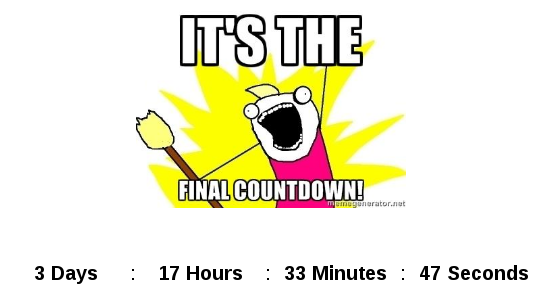(--prod compatible)
Fork https://github.com/matheushf/ng2-date-countdown
npm install ng2-date-countdown --save
In your app.module, add CountdownModule to your imports:
import { CountdownModule } from "ng2-date-countdown";
@NgModule({
declarations: [
AppComponent
],
imports: [
BrowserModule,
CountdownModule
],
bootstrap: [AppComponent]
})
(reached)="someFunction($event)" You can use a Callback function for when it reaches 0"
[text]: Change the text displayed in the date
[units]: Choose which units do you want to display
[divider]: Choose what you want to divide the dates with
[showZeros]: Choose if you want to show a zero before the number '01 Days'
In your html template:
<countdown units="Year | Month | Days | Hours | Minutes | Seconds" end="July 22, 2019"></countdown>
To set a custom Language and divider, set this variable in your component.ts file:
text:any = {
Year: 'Year',
Month: 'Month',
Weeks: "Weeks",
Days: "Days",
Hours: "Hours",
Minutes: "Minutes",
Seconds: "Seconds",
MilliSeconds: "MilliSeconds"
};
In your .html:
<countdown (reached)="callback($event)" [text]="text" units="Year | Month | Days | Hours | Minutes | Seconds" end="July 22, 2019"></countdown>
To customize the Countdown (.scss), use the class from it (you can inspect from chrome elements) and put the '/deep/' before them, example:
/deep/ .countdown {
width: 100%;
height: 100px;
background: black;
.measurements {
color: white;
margin-right: 5px;
padding: 10px;
}
.divider {
font-size: 30px;
}
(inspired on angular-simple-countdown)



